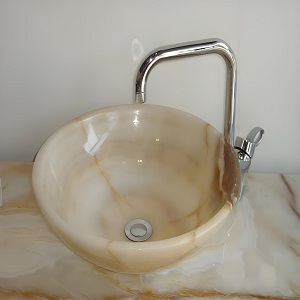
In modern home and commercial design, the kitchen and bathroom are more than just functional spaces—they are central to the aesthetic and practical experience of the environment. Solid Surface Sinks have become increasingly popular in these areas due to their seamless integration, durability, and customizable designs.

What Are Solid Surface Sinks?
Solid Surface Sinks are crafted from the same materials as solid surface countertops—combinations of acrylic, polyester resins, and natural minerals. This composition creates a durable, non-porous, and versatile material that can be seamlessly integrated into countertops, providing a sleek, unified look. Solid surface sinks are available in various shapes, sizes, and colors, making them suitable for a wide range of design preferences and functional requirements.
Key Features of Solid Surface Sinks
Seamless Integration:One of the most appealing features of solid surface sinks is their ability to be seamlessly integrated into countertops. This eliminates the visible joints and seams commonly found in traditional sink installations, creating a smooth and continuous surface. This not only enhances the aesthetic appeal but also simplifies cleaning and maintenance.
Hygienic and Non-Porous:Solid surface sinks are non-porous, meaning they do not absorb liquids or harbor bacteria. This makes them an excellent choice for kitchens and bathrooms where hygiene is paramount. The non-porous nature of the material ensures that the sinks remain stain-resistant and easy to clean, reducing the risk of mold and mildew.
Durability and Repairability:Solid surface sinks are highly durable and can withstand daily wear and tear. While they may scratch or chip over time, the material is repairable. Minor damage can often be sanded and polished out, restoring the sink to its original condition. This reparability extends the lifespan of the sink, making it a cost-effective investment.
Customizable Design:Solid surface sinks offer a high degree of design flexibility. They can be custom-made to fit specific dimensions and shapes, allowing for creative and unique sink designs. The material's ability to be thermoformed means that designers can create integrated sinks with fluid, organic shapes that complement the overall design of the space.
Variety of Colors and Finishes:With a broad range of colors and finishes available, solid surface sinks can match or contrast with surrounding surfaces, providing endless design possibilities. Whether you prefer a classic white sink or a bold, vibrant hue, Solid Surface Materials can accommodate your aesthetic preferences.
Applications of Solid Surface Sinks
Solid surface sinks are used in various settings, each benefiting from the material's unique properties. Some common applications include:
Kitchen Sinks:In the kitchen, solid surface sinks offer a seamless, integrated look with countertops. Their non-porous nature makes them easy to clean, essential for maintaining hygiene in food preparation areas. The ability to create custom sizes and shapes allows for deep, spacious basins that can handle large pots and pans.
Bathroom Sinks:For bathrooms, solid surface sinks provide a sleek, modern appearance. They can be integrated with countertops or designed as stand-alone vessel sinks. The material’s resistance to moisture and ability to be shaped into various forms makes it ideal for creating elegant and functional bathroom sinks.
Healthcare Facilities:In healthcare settings, hygiene and durability are critical. Solid surface sinks are used in hospitals, clinics, and laboratories due to their non-porous, easy-to-clean surfaces. They can withstand frequent cleaning with harsh chemicals, ensuring a sterile environment.
Commercial Spaces:In commercial settings such as restaurants, hotels, and offices, solid surface sinks offer both functionality and design flexibility. They can be customized to fit specific design themes and handle the high usage typical in commercial environments.
Educational Institutions:Schools and universities benefit from the durability and ease of maintenance of solid surface sinks. Whether in science labs or restrooms, these sinks provide a reliable and hygienic solution.
The Future of Solid Surface Sinks
As design trends and technology continue to evolve, solid surface sinks are likely to see further innovations. Advances in manufacturing processes could lead to even more durable and sustainable materials. Additionally, new colors, patterns, and textures will continue to expand the design possibilities, allowing for even greater customization and creativity in sink designs.
Solid Surface Sinks offer a unique combination of aesthetic appeal, durability, and practicality. Their seamless integration, non-porous properties, and customizable designs make them an ideal choice for a wide range of applications, from residential kitchens and bathrooms to commercial and healthcare settings. As a versatile and reliable material, solid surface sinks will undoubtedly continue to be a popular choice in modern interior design.